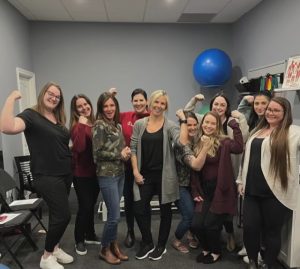As a woman soon to be entering the field as a rehabilitative professional, I have realized the importance of having female representation in the healthcare field and want to share some thoughts. After working with the Waterdown Village Chiropractic & Wellness Group team for over 3 years now, I am so lucky to have so many woman colleagues as role models that I look up to. I see how hard they worked to get to where they are, how important it is for them to make a difference with their patients and clients, and how connected we are with one another as a community of women supporting each other in health and wellness. Not only do I see this in our team, but in our patients and clients who work in healthcare and prioritize wellness for their whole family as well.
While women are becoming increasingly more represented in allied health professions, that does not always mean they are equally as respected. Female RMTs may be looked over with the assumption they cannot provide as deep pressure as male RMTs, or male physiotherapists are referred to first for things like sports injuries. These may seem like small injustices, but they add up to create a complex where female providers are inferior, which is NOT the case!
There is also the pressure of traditional gender roles, where women healthcare providers are expected to look after kids and work full time. They are juggling patients, business, family, and spousal relationships all at the same time. While there are a lot of men who do this too, men are praised for balancing his career and family, yet women are expected to do this.
There is a need for women to be healthcare professionals because women have a better understanding of their female patients in areas that pertain to women’s anatomy, birth, and health, as they often have personal experience. This familiarity is why women seek out other women to be their healthcare providers, and what gives patients a sense of comfort that their doctor or therapist truly knows what they are feeling. Healthcare studies looking at women’s health are severely lacking, and most medications and therapies have been studied on men and so few on women (Yakerson, 2019). Women also make the majority of healthcare decisions for their families. A survey of Canadian parents done by the Canadian Women’s Foundation found that “mothers in Canada are struggling under the brunt of the day-to-day decision-making and care for their children and families, including shouldering worry for their family’s mental and physical health” (2021). In fact, 46% of women reported they are reaching their breaking point. Therefore it is extremely important for women to be represented in all healthcare professions so that mothers feel supported to make the best decisions for their families.
Further, the healthcare and rehabilitative professions require qualities like empathy and compassion for a patient-centred approach, and these are qualities are seen more frequently with female professionals. While men are also capable of these qualities and of making deep connections, there are studies confirming that the way men and women communicate are different. Something that will help me be a more compassionate rehab professional is looking back on experiences where my previous providers were not empathetic and how that affected my comfort level to ask questions and feel properly cared for. The fact of the matter, and the main thing I want you to take away from this blog, is that healthcare teams benefit from a mix of skills, experiences, and backgrounds where both men AND women are represented with open communication and collaboration, so ALL patients feel understood and cared for.
I am so proud to be part of a team where women’s health is understood and prioritized. I am so grateful to be part of a team where women are well-represented in their professions. And I am so excited and passionate to be joining a field where there is space for me, yet still so much work to be done!
By: Sara VanDyk, Communications Coordinator (MClSc, Speech-Language Pathology Candidate)


